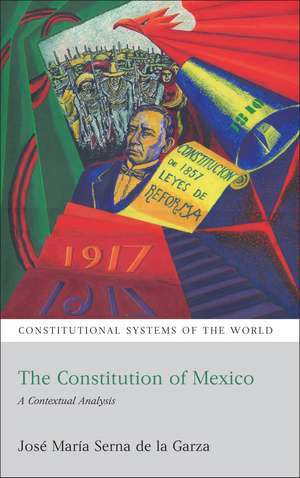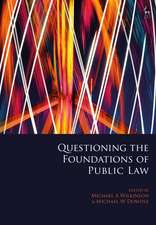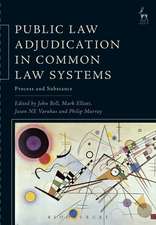The Constitution of Mexico: A Contextual Analysis: Constitutional Systems of the World
Autor José María Serna de la Garzaen Limba Engleză Paperback – 30 mai 2013
Din seria Constitutional Systems of the World
- 13%
 Preț: 174.07 lei
Preț: 174.07 lei - 38%
 Preț: 134.64 lei
Preț: 134.64 lei - 23%
 Preț: 197.68 lei
Preț: 197.68 lei - 14%
 Preț: 147.59 lei
Preț: 147.59 lei - 34%
 Preț: 509.52 lei
Preț: 509.52 lei - 28%
 Preț: 374.41 lei
Preț: 374.41 lei - 40%
 Preț: 466.81 lei
Preț: 466.81 lei - 22%
 Preț: 263.72 lei
Preț: 263.72 lei - 23%
 Preț: 185.93 lei
Preț: 185.93 lei - 19%
 Preț: 166.82 lei
Preț: 166.82 lei - 23%
 Preț: 152.82 lei
Preț: 152.82 lei - 21%
 Preț: 218.26 lei
Preț: 218.26 lei - 23%
 Preț: 178.47 lei
Preț: 178.47 lei - 19%
 Preț: 303.62 lei
Preț: 303.62 lei - 18%
 Preț: 300.14 lei
Preț: 300.14 lei - 30%
 Preț: 510.03 lei
Preț: 510.03 lei - 14%
 Preț: 192.30 lei
Preț: 192.30 lei - 18%
 Preț: 304.66 lei
Preț: 304.66 lei - 23%
 Preț: 178.02 lei
Preț: 178.02 lei - 18%
 Preț: 225.31 lei
Preț: 225.31 lei - 23%
 Preț: 197.14 lei
Preț: 197.14 lei - 18%
 Preț: 180.44 lei
Preț: 180.44 lei - 18%
 Preț: 179.98 lei
Preț: 179.98 lei - 18%
 Preț: 186.35 lei
Preț: 186.35 lei - 14%
 Preț: 179.00 lei
Preț: 179.00 lei - 16%
 Preț: 218.47 lei
Preț: 218.47 lei - 18%
 Preț: 297.58 lei
Preț: 297.58 lei - 16%
 Preț: 218.00 lei
Preț: 218.00 lei - 18%
 Preț: 232.54 lei
Preț: 232.54 lei - 23%
 Preț: 171.85 lei
Preț: 171.85 lei - 18%
 Preț: 225.49 lei
Preț: 225.49 lei - 14%
 Preț: 185.93 lei
Preț: 185.93 lei - 13%
 Preț: 230.79 lei
Preț: 230.79 lei - 13%
 Preț: 186.10 lei
Preț: 186.10 lei - 19%
 Preț: 179.10 lei
Preț: 179.10 lei -
 Preț: 223.20 lei
Preț: 223.20 lei - 18%
 Preț: 180.44 lei
Preț: 180.44 lei -
 Preț: 217.09 lei
Preț: 217.09 lei - 18%
 Preț: 186.35 lei
Preț: 186.35 lei
Preț: 184.14 lei
Preț vechi: 227.25 lei
-19% Nou
Puncte Express: 276
Preț estimativ în valută:
35.23€ • 36.89$ • 29.15£
35.23€ • 36.89$ • 29.15£
Carte tipărită la comandă
Livrare economică 05-19 aprilie
Preluare comenzi: 021 569.72.76
Specificații
ISBN-13: 9781849462884
ISBN-10: 1849462887
Pagini: 254
Dimensiuni: 138 x 216 x 10 mm
Greutate: 0.3 kg
Editura: Bloomsbury Publishing
Colecția Hart Publishing
Seria Constitutional Systems of the World
Locul publicării:London, United Kingdom
ISBN-10: 1849462887
Pagini: 254
Dimensiuni: 138 x 216 x 10 mm
Greutate: 0.3 kg
Editura: Bloomsbury Publishing
Colecția Hart Publishing
Seria Constitutional Systems of the World
Locul publicării:London, United Kingdom
Caracteristici
This book provides an overview of Mexico's political evolution since it became independent from Spain in 1821, and its current constitutional arrangements, principles and structures.The book aims to explain this evolution as the result of struggles between the interests and ideologies of different groups within Mexican society.A useful tool for those working in the area of comparative constitutional law.
Notă biografică
José María Serna de la Garza is a Researcher at the Institute of Legal Research and Professor at the Law School, both of the National University of Mexico.
Cuprins
1: Mexico's Constitutional Trajectory I. Introduction II. Democracy III. Republicanism IV. Federalism V. Separation of State and Church VI. Fundamental Rights VII. The Nation's Ownership of Mineral Resources VIII. Conclusion 2: Democracy and the Electoral System I. Introduction II. Institution-building and the Transition to Democracy III. The Judicialisation of the Electoral-Political Process IV. The Impact of the Inter-American System on Human Rights V. Conclusion 3: The Legislative Branch of Government I. Introduction II. Bicameralism III. Rules on the Integration of the Two Chambers of Congress IV. Organising the Work of Both Chambers of Congress V. The Committee System of Congress VI. Parliamentary Groups in Congress VII. The Permanent Committee of Congress VIII. The Powers of Congress IX. The Legislative Process X. Congress's Powers to Check the Executive XI. Jurisdictional-like Functions of Congress XII. The 'Superior Audit of the Federation' XIII. Conclusion 4: The Executive Branch of Government: Presidencialismo I. Introduction II. The Formation of the Tradition of a Strong Executive Power III. Social Change, Economic Reorganisation and Constitutional Reform: The End of the Hegemonic Party System IV. Election of the President and his Position as Both Head of State and Head of Government V. The President and the Legislative Process VI. The President and the Fiscal Process VII. Conclusions 5: The Judicial Branch of Government: Courts and Judicial Review I. Introduction II. The Structure and Organisation of the Judicial Power in Mexico III. Judicial Power, Control of Constitutionality and the Writ of Amparo in Mexico IV. Backlog as the Consequence of the Amparo Casacion: 'The Impossible Task of the Court' V. Towards a Constitutional Court: The Reform of 1994 VI. The Court's Article 97 Investigative Power VII. Conclusion 6: The Federal System I. Introduction II. The Constitutional Formula for Allocating Legislative Competences III. Fiscal Federalism IV. Mechanisms of Collaboration in Mexico's Federal System V. Municipal Government VI. The Constitutional Status of the Federal District VII. Recent Developments in State Constitutionalism VIII. Conclusion 7: The Protection of Human Rights I. Introduction II. Domestic and International Pressures and the Shift Towards a New Human Rights Policy in Mexico III. Changes in the Supreme Court's Interpretation of Human Rights IV. Constitutional Reform Relative to the Criminal Justice System V. The Emergence of a New Paradigm on Human Rights VI. Freedom of Religion and the Separation of State and Church VII. Conclusion 8: The Constitution and the National Economy I. Introduction II. The Constitutional Regime of Property Rights in Mexico III. Public Property IV. Planning V. Agrarian Reform and Social Property VI. Expropriation of the Oil Industry VII. The Electric Power Sector VIII. Conclusion Concluding Thoughts: Democratic Transition and Constitutional Change in Mexico
Recenzii
.an excellent book describing Mexican constitutional organisation.Very few books have been able to present such a detailed and contextual, brief and at the same time rich analysis of the Mexican constitutional system, particularly in English and from a legal perspective. For this important achievement, we cannot but give an enthusiastic welcome to this book.
Descriere
This book provides an overview of Mexico's political evolution since it became independent from Spain in 1821, and its current constitutional arrangements, principles and structures.















